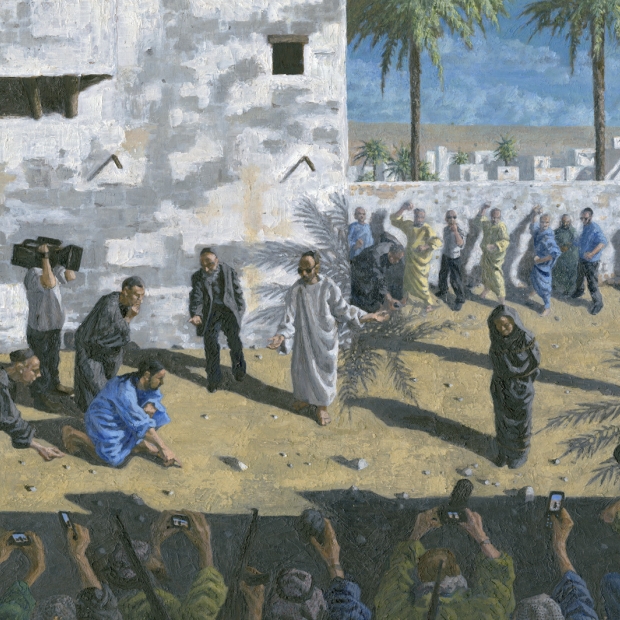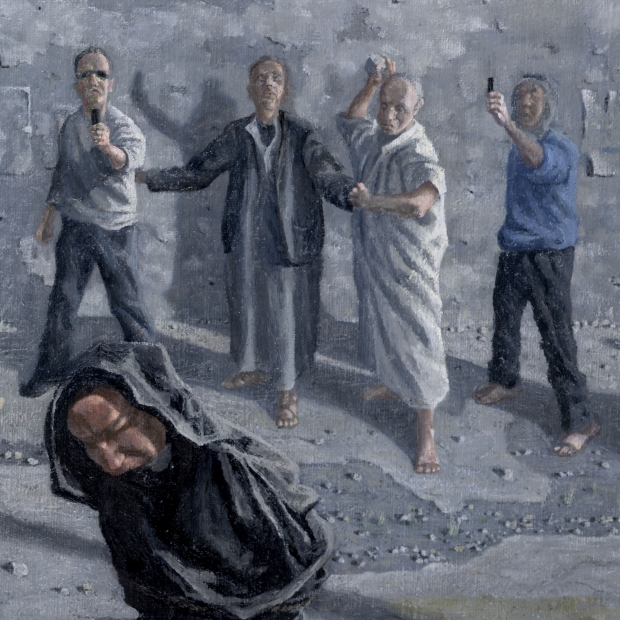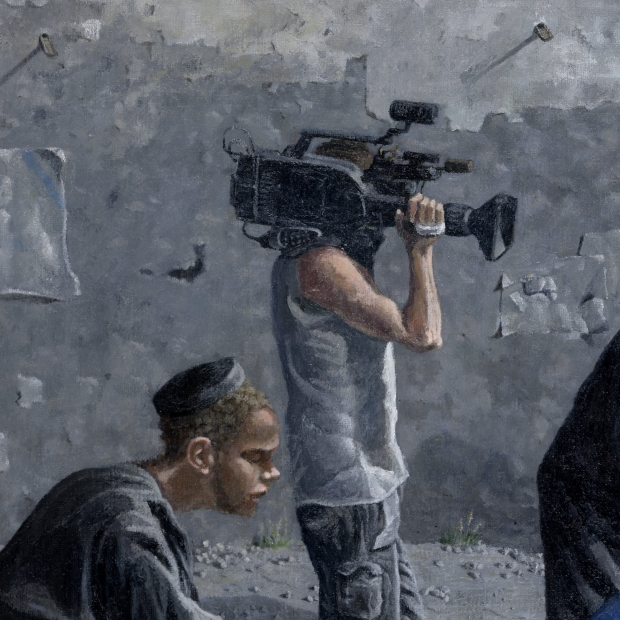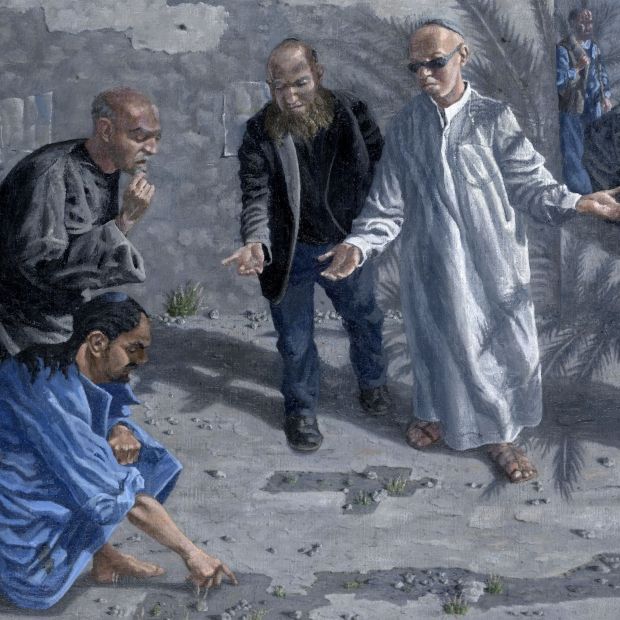March 19: “I Do Not Condemn You, Either. From Now On Sin No More”
♫ Music:
Day 31 - Friday, March 19
Title: “I DO NOT CONDEMN YOU, EITHER. FROM NOW ON SIN NO MORE”
Scripture: John 8:3-11
The scribes and the Pharisees brought a woman caught in adultery, and having set her in the center of the court, they said to Him, “Teacher, this woman has been caught in adultery, in the very act. Now in the Law Moses commanded us to stone such women; what then do You say?” They were saying this, testing Him, so that they might have grounds for accusing Him. But Jesus stooped down and with His finger wrote on the ground. But when they persisted in asking Him, He straightened up, and said to them, “He who is without sin among you, let him be the first to throw a stone at her.” Again He stooped down and wrote on the ground. When they heard it, they began to go out one by one, beginning with the older ones, and He was left alone, and the woman, where she was, in the center of the court. Straightening up, Jesus said to her, “Woman, where are they? Did no one condemn you?” She said, “No one, Lord.” And Jesus said, “I do not condemn you, either. Go. From now on sin no more.”
Poetry:
Writing in the Dust
by Roger Wagner
The men taken in hypocrisy
The beating of a swallow’s wings,
A stone jar poised as if to fall,
A fierce and unforgiving sun
That beats upon a whitewashed wall
That finds and tracks each human flaw
And reads the writing in the dust
Of broken hopes and powdered dreams
And love reclassified as lust.
Where images of shameful death
Describe a life defined by blame,
The beatings of a swallow’s wings
Above a place of public shame
Are like the barest breath of grace
That stir the unforgiving air:
That shift the gaze and lead the eye
Beyond the camera’s fatal stare
To where one writes within that dust
Of dry bones in a bone-dry place,
Of broken hopes and powdered dreams -
The unseen, unhoped, words of grace
Which free accuser and accused
Which spell out how our life begins;
A motion like a breath of grace:
The beating of a swallow’s wings.
I DO NOT CONDEMN YOU, EITHER; FROM NOW ON SIN NO MORE
In the Bible, just like in the history of humanity, we witness plenty of stories of abuse of power connected to sexual sins like the story of David raping Bathsheba, a married woman. In the story in John 8, self-righteous religious leaders confronted Jesus with the dilemma of fulfilling the law of Moses or extending grace to a woman caught in adultery. However, the blame and shame are only attributed to the woman, not the man who is also involved. The combination of power and lust tragically transforms into many forms of sexual abuse of innocent people, especially women. In patriarchal or male dominated societies, men create systems that grant them some immunity and privilege over others, dangerously opening doors that can lead to the abuse of women. In this intense story, a woman is used as a bait to test Jesus. She is the only woman in the midst of a group of men who is publicly treated without respect and dignity. Jesus is the only one who sees her fully and values her. Because Jesus values women as equals to men, fully worthy of dignity and love, he confronts the unfair attack over her.
Jesus knows that the main problem is rooted in their own hearts, “He who is without sin among you, let him be the first to throw a stone at her.” To avoid recognizing our own sin, we tend to blame others for it. Unfortunately, in the case of the sin of lust, this self-protecting action is especially useful to men in positions of power when they want to accuse women for their own sins.
In our culture, we are familiar with what some consider “good male practices to avoid lust,” that are actually excuses and alibis to avoid taking personal responsibility for their own sin, all to the detriment of women. For this reason, Sheila Wray Gregoire, Rebecca Gregoire Lindenbach, et al. in their new book The Great Sex Rescue: The Lies You’ve Been Taught and How to Recover What God Intended rightly say, “Defeating lust is not about limiting a man’s encounters with women; it’s about empowering men to treat the women around them as whole people, daughters of Christ. The key to defeating lust is not to avoid looking at women; it’s to actually see them” (p.92). That is exactly what Jesus modeled in the passage.
Living is a fallen world, even when our sexuality is a gift from God, it frequently exposes our insecurities and fears. Our new life in Christ reverses the power of sin in our lives and helps us, with the power of the Holy Spirit, to move away from hiding, embarrassment and selfishness to vulnerability, intimacy, and love. In Christ, we are secured, accepted, and safe to love ourselves and others. With Jesus as our model, we are to treat others with the same value and dignity they deserve as image bearers of the living God. And speak up when we see injustice and misuse of authority to cover up sin.
Prayer:
Our Father, we all are sinners in desperate need of divine grace. We need to see and treat others with the dignity and value they deserve because we all are created in your image. Help us to see others, especially the most vulnerable, with the eyes of Jesus. With the power of the Holy Spirit help us to seek justice and fight for equality for women and those who have suffered for the sins of others. May we all be messengers of Shalom (peace) to everybody around us as we live under your grace and guidance.
Amen
Octavio Javier Esqueda
Professor of Christian Higher Education
Director of Ph.D. and Ed.D. Programs in Educational Studies
Biola University
For more information about the artwork, music, and poetry selected for this day, we have provided resources under the “About” tab located next to the “Devotional” tab.
About the Artwork:
Writing in the Dust (several views)
Roger Wagner
2016
Oil on canvas
In today’s painting artist Robert Wagner places the narrative of the adulterous woman into today’s contemporary media-driven world. Here we are witness to the story of a woman caught in adultery who is brought before Jesus by a group of scribes and Pharisees for judgment and stoning as prescribed by Mosaic Law. Wagner paints this exchange between Jesus and the Pharisees with television news crews and by-stander cell phones ready to capture any scandalous moment for the public’s appetite for tabloid sensationalism. But in the end, it’s Jesus’ actions and words that prevail to teach us about the nature of forgiveness, mercy, and justice.
About the Artist/Poet:
Roger Wagner (b. 1957) is a British artist and poet. Wagner studied English at Oxford University before studying at the Royal Academy School of Art. He has been represented in London since 1985 by Anthony Mould Ltd. and has exhibited there many times. Other one-man shows include retrospectives at the Ashmolean Museum in 1994 and 2010. He has produced several books of illustrated poems and translations including: Fire Sonnets (1984); In a Strange Land (1988); A Silent Voice (1997); Out of the Whirlwind (1997); The Book of Praises—a translation of the psalms produced as Book One (1994); Book Two (2008); and Book Three (2013). His major work Menorah was acquired by the Ashmolean Museum in 2010, and currently hangs in St. Giles Church in Oxford. In 2019, Canterbury Press published a collection of Wagner’s poems and images entitled The Nearer You Stand. In Wagner’s work, several themes emerge: the Renaissance, the English landscape, poetry, and Christian meditation. Wagner’s paintings possess a sense of stillness at the center of the storm, a confirmation that there is hope in the face of despair. Wagner is not afraid to grapple with issues of judgment and suffering in his work, but his theology is always rooted on the all-sufficient love of God.
http://www.rogerwagner.co.uk/work/item/206/writing-in-the-dust-(2016)
http://www.rogerwagner.co.uk/profile
https://imagejournal.org/artist/roger-wagner/
About the Music:
“Psalm 51” from the album Psalm 51 (Single)
Lyrics:
Have mercy oh God
With unfailing love
With great compassion
Blot out my transgression
Against you alone,
Have I surely sinned
Truly you are right,
In your accusation
Do not cast me away
Do not take your spirit from me
Do not cast me away
Your presence is my only worth
If you asked for a sacrifice I’d bring it
If you needed an offering I’d burn it
Somehow the things that you love
Are the things I am now
Broken spirit and heart
How can it be You would take delight?
About the Composer and Performers:
Poor Bishop Hooper is the husband-and-wife duo of Jesse Braswell Roberts and Leah Brace. Both hailing from small towns in central Kansas, they began writing, recording, and performing together after their marriage in 2013. Though they still often perform classic covers and simple tunes in simple places, they’ve been blessed to develop a vibrant musical ministry, ranging from full band, heavy mood moments like that in The Golgotha Experience to the string and vocal-laden scores of Firstborn. Their most recent project, called EveryPsalm, begun January 2020, releases a psalm-based song each week and will until all the psalms are sung. Their hearts for the Creator and the endless bountiful inspiration he provides are ever-growing in their music.
https://www.poorbishophooper.com/
About the Devotion Author:
Octavio Javier Esqueda
Professor of Christian Higher Education
Director of Ph.D. and Ed.D. Programs in Educational Studies
Talbot School of Theology
Biola University
Dr. Octavio Javier Esqueda is a professor of Christian higher education in the doctoral programs at Talbot School of Theology at Biola University. He was born and raised in Guadalajara, México, where he graduated with honors with a Licenciatura in Latin American Literature from the University of Guadalajara, as well as two additional diplomas, one in religion and society and the second in journalism. He graduated with honors from Dallas Theological Seminary with an M.A. in Christian Education and completed his Ph.D. in Higher Education at the University of North Texas. Before coming to Biola University, he taught at Southwestern Baptist Theological Seminary in Fort Worth, Texas. He and his wife, Angélica, have two children, Darío and Salma. Dr. Esqueda has several publications on theological education, Christian higher education, and literature. Teaching is his passion and he has had the opportunity to teach in several countries on different academic levels. He is also an avid soccer fan.



